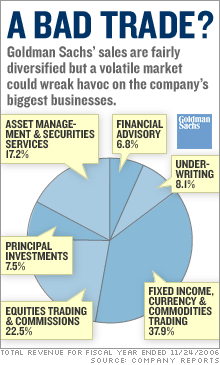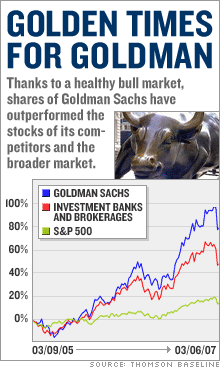Goldman Sachs: Not so goldenStock Spotlight: The Wall Street powerhouse is likely to report solid results, but now isn't the time to buy.NEW YORK (CNNMoney.com) -- If money grows on trees, then Goldman Sachs may have the greenest thumb around. The Wall Street powerhouse has reported record earnings and revenue for the past three years, and in the past 12 months its stock has surged 36 percent, far outpacing its rivals. "Goldman is a great business. They have in the last few years generated profitability beyond most people's expectations," said Justin Fuller, an equity analyst at mutual fund and stock research firm Morningstar. But keeping up its record-setting pace will be difficult. Analysts forecast that Goldman's revenue grew just 3 percent and earnings per share fell 4 percent for its fiscal first quarter ended in February. Goldman's due to report results next week. Analysts expect the New York-based investment to post earnings of $4.90 a share of revenue of $10.7 billion, according to a survey by earnings tracker Thomson First Call. Goldman (Charts) has a track record of blowing past analysts' estimates, but last year's stellar performance has set a high bar for future comparisons. Surpassing those results would be no easy feat - even if market conditions were favorable. And the recent stock market downturn has raised worries about the near-term outlook for investment banks. When markets around the globe swooned last week, Goldman, Merrill Lynch (Charts), Morgan Stanley, Lehman Brothers and Bear Stearns lost about $18 billion in market value combined in just one session. Like other brokerages, Goldman's results tend to rise and fall in tandem with global market conditions. Market watchers are debating whether the worst of the sell-off is over, but they agree that more volatility looms ahead. Why Goldman is great Goldman Sachs, founded in 1869, has built itself into a moneymaking machine by attracting the best talent Wall Street has to offer. "They've got very smart traders. They're well diversified when it comes to commodities and [foreign exchange], and they have very good international exposure," said Marc Davis of Tradition Capital Management, a money manager that owns shares of Goldman. The investment brokerage paid out a staggering $16.5 billion in compensation last year. Its top three executives - CEO Lloyd Blankfein and co-presidents Gary Cohn and Jon Winkelried - each received payouts in excess of $50 million. If that seems extreme, consider last year's results, when Goldman set records for revenue and earnings. Revenue soared 49 percent to $37.7 billion, while earnings per share surged 76 percent to $19.69 a share for the year ended Nov. 24. Goldman's legendary trading desk has helped the company rake in revenue from stocks, bonds, commodities and other investments. Revenue from trading and principal investments soared 57 percent to $6.6 billion in the fourth quarter. While trading accounts for the biggest chunk of revenue, Goldman's investment banking division, which advises companies on mergers and acquisitions and helps firms go public and issue debt, hasn't been hurting, either. Goldman came out on top in the global mergers and acquisitions rankings last year, according to Thomson Financial. It also took the No. 1 spot in taking companies public and related stock offerings in the United States last year. Goldman has benefited from the wave of dealmaking that has swept across markets worldwide - not just in its advisory business but from private equity as well. Morgan Stanley (Charts) and Citigroup (Charts) have also delved into the buyout business, but Goldman is a "unique animal" because it's been so successful with these investments, one analyst said. Goldman raised $8.5 billion for a private equity fund in 2005, and the market is buzzing with talk that it will bring in $19 billion for its newest fund. Rough road ahead Goldman's been a success story, but analysts don't expect the firm to be able to keep spinning gold forever: revenues are expected to slow, and earnings per share are forecast to decline this fiscal year. Dick Bove, an analyst with Punk Ziegel, expects Goldman to post solid earnings for the first quarter, but the outlook for the remainder of the year isn't likely to be as strong. About two-thirds of revenue comes from Goldman trading and investing for its own account, so profitability is closely tied to the health of financial markets. Thus, market turmoil could hurt Goldman. A sharp decline in Chinese markets tanked stocks around the world last week - and sent Goldman's stock into a nosedive. To that end, Merrill Lynch analyst Guy Moszkowski downgraded Goldman, Lehman Brothers (Charts) and Bear Stearns (Charts) to "neutral" from "buy" after the Dow plummeted 416 points on Feb. 27. A slowdown in China could also hurt Goldman since it owns a stake in the Industrial and Commercial Bank of China, one of China's big four state-owned commercial banks. And a weakening U.S. economy is likely to slow trading activity, Bove said. Still, Goldman is better positioned than its counterparts since it has less exposure to the subprime mortgage business, Moszkowski noted. Economists have worried that problems in the subprime mortgage sector - loans to borrowers with the weakest credit history - could slow the housing recovery and hurt the broader economy. In addition, many investment banks have purchased large portfolios of subprime loans. (Subprime woes: How far, how wide?) Time to buy? Despite the recent market shakeout, the long-term outlook for Goldman remains upbeat. Analysts forecast earnings to grow at a rate of 15 percent annually over the next few years, the highest growth rate in the sector. "It's a great firm, and it's a good buy if investors buy in at the right time," said Morningstar's Fuller. The stock doesn't look too pricey: shares of Goldman trade at roughly 10 times estimated 2007 earnings, about in line with its rivals. But valuations for investment banks have to be taken with a grain of salt since quarterly earnings are difficult to predict. In addition, those investing in Goldman now would be buying near a peak. Just before its recent pullback, Goldman's stock was trading at $222 a share, its highest price since the bank went public in 1999. Punk Ziegel's Bove said investors should use this opportunity to sell rather than buy Goldman. "People ought to prune their position. The outlook is going to slow down meaningfully. Earnings are going to have a difficult time equaling 2006," he said. Furthermore, Goldman has done extremely well compared to its peers over the past few years - which means upside potential may be greater for some of its rivals, analysts said. There's no question Goldman is the Goliath on Wall Street, and, over the long-term, the stock's a solid bet, analysts said. But with global financial markets in flux, the company faces a rocky road, which means investors may want to hold off for a better buying opportunity. None of the analysts quoted in this story own shares of Goldman Sachs, but Merrill Lynch has an investment banking relationship with Goldman. |
|


